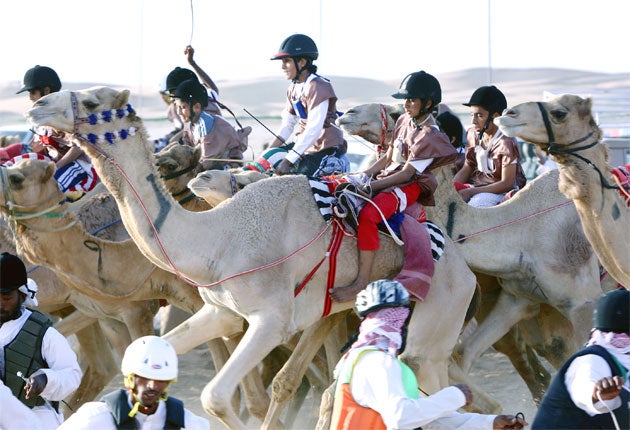UAE defies ban on child camel jockeys

children as young as 10 are working as camel jockeys in the United Arab Emirates despite a law banning underage riders, new photos reveal.
The youngsters competed in a festival last month racing at speeds of up to 30mph around a track in Abu Dhabi, according to pressure group Anti-Slavery International.
Observers from the organisation saw one child fall from a camel and narrowly escape being trampled at the Sweihan race track. Their pictures show children with badly fitting hats falling over their eyes at an event attended by dignitaries and uniformed police officers.
In 2005, after pressure from campaigners, the UAE banned under-18s from the sport. Youngsters had been killed or hurt, suffering head and spinal injuries and damaged genitals. Under the law, the use of children as jockeys is punishable by up to three years in prison and fines.
Before the ban, there were up to 3,000 child jockeys in the UAE, many of them trafficked from Pakistan, Bangladesh, Sudan and Mauritania, but only about 1,000 were returned home under a repatriation scheme.
Catherine Turner, a child labour expert at Anti-Slavery International, said anecdotal evidence suggested that fewer child jockeys had been racing since the ban and the underage jockeys were older than before. Young riders are favoured because they are light.
Anti-Slavery's observers openly photographed abuses at the course. They spoke to children at the event who said they were from the UAE, but their appearance and the languages they used aroused suspicion.
"We are concerned that the fact the race was attended by the police and UAE dignitaries means that child protection is not being taken seriously." Nobody was available for comment at the UAE embassy in London.
Join our commenting forum
Join thought-provoking conversations, follow other Independent readers and see their replies
Comments
Bookmark popover
Removed from bookmarks